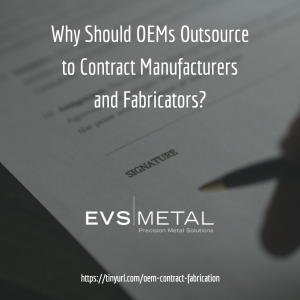 Over the last fifteen years, original equipment manufacturers (OEMs) have been consolidating. This has created an increased (and still-increasing) demand for quality contract manufacturers and fabricators.
Over the last fifteen years, original equipment manufacturers (OEMs) have been consolidating. This has created an increased (and still-increasing) demand for quality contract manufacturers and fabricators.
What’s the difference between an OEM and a contract manufacturer?
The term “OEM” can have several definitions. In general, it’s considered to be a company that produces finished parts or equipment that is then marketed by another manufacturer as their own, even if they had no hand in its actual manufacturing (although they do tend to supply design and engineering input).
Contract manufacturers and fabricators, on the other hand, are “contracted” by OEMs to produce parts or components for the OEMs. In fact, there are entire companies that are considered OEMs that don’t actually produce a single physical product, and instead function more like a middleman between multiple contract manufacturers and the company that will eventually sell the fully-integrated, finished products.
What are the advantages of using a contract manufacturer as an OEMs?
There are a number of reasons why OEMs turn to CMs for metal manufacturing and fabrication:
- OEMs are slimming down: As said previously, the last two decades have seen OEMs consolidating. They are also moving to countries outside of the U.S. and outsourcing more work. This has lead to OEMs working with CMs earlier and more frequently in the manufacturing and fabrication process — including for design and engineering assistance — in order to off-load some of the workload they can no longer handle.
- OEMs can’t staff up: Even when OEMs want to “do it themselves,” they often find that they don’t have the labor force to make it happen and hiring is a slow and often difficult process. A 2014 study by consulting firm Accenture and The Manufacturing Institute found that the shortage is considered “severe” by most OEM executives in the U.S. Contract manufacturers and fabricators help fill that gap.
- CMs help OEMs move their business forward: Metal manufacturing and fabrication are expensive processes to set up, maintain, and “own.” For OEMs that are also highly-involved with and dependent upon innovation to spur growth, it can be one that is too expensive to support. When an OEM can put more financial resources into research & development (R&D) instead of specialized manufacturing resources, they have a better chance to being able to maintain an edge over competitors in their market or industry. This makes contract manufacturing a solid investment for many OEMs.
How does EVS Metal create efficiences for OEMs?
EVS Metal is an ISO 9001:2015-certified leader in quality precision sheet metal fabrication with four locations across the U.S. Our stainless steel and aluminum fabrication, finishing, integration and assembly capabilities expand far beyond traditional fabrication practices in order to provide OEMs with a distinct competitive advantage — the option to utilize EVS’ comprehensive range of in-house manufacturing solutions.
Whether our clients require product design and engineering, CNC machining, powder coat finishing, or logistics assistance, our team of experts delivers quality outcomes that meet our customers’ requirements and exceed their expectations. We guarantee that each job will result in the production of superior products at highly competitive prices for every order, no matter the size. For more information or to request a quote, contact EVS Metal today.





